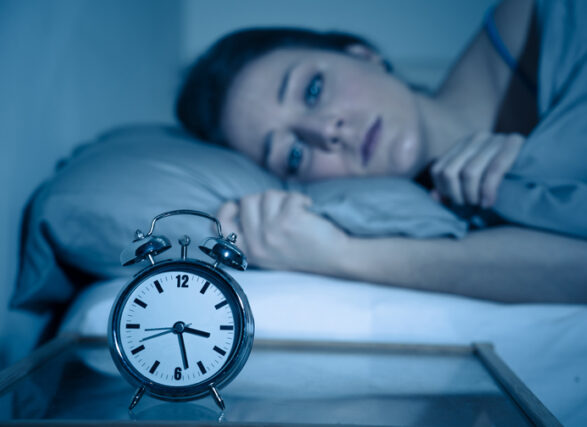Sleep is one of the most important elements of good health.

That’s so much the case that sleep deprivation has been used as a torture method over the years (and still is). The truth is that the way you sleep (or don’t) can reveal more about your physical and mental health than you might think. While some habits and patterns might seem harmless, others can point to underlying issues that need investigating and possibly treating. If you struggle with these things when trying to get some shut-eye, it’s time to get in touch with your GP.
1. You lie awake for hours before falling asleep.

Tossing and turning for what feels like forever night after night is more than frustrating—it could be a sign of insomnia or heightened stress levels. Persistent difficulty falling asleep often points to anxiety, depression, or even an irregular sleep routine that’s throwing off your internal clock. Left unchecked, it can snowball into physical and mental health challenges, from weakened immunity to mood swings. If this is a regular issue, finding ways to manage stress or adjusting your bedtime habits can make a huge difference.
2. You wake up multiple times during the night.

Broken sleep can feel worse than no sleep at all, leaving you groggy and out of sorts the next day. If you’re waking up repeatedly, it might be caused by sleep apnoea, restless legs syndrome, or even an uncomfortable bedroom environment. Interrupted sleep keeps your body from entering the deeper, restorative stages it needs to recharge. Tracking your habits or speaking with a professional can help uncover the root cause—and help you wake up feeling refreshed.
3. Your snoring is loud or irregular.

A little snoring here and there might be normal, but when it’s loud, uneven, or causing you to wake up gasping, it could be a sign of sleep apnoea. This condition disrupts your breathing, lowering oxygen levels and putting extra strain on your heart. Over time, it can increase the risk of high blood pressure, heart problems, and chronic fatigue. If your snoring is more than a minor annoyance, getting it checked out could protect both your sleep and your health.
4. You feel tired even after a full night’s sleep.

There’s nothing more frustrating than clocking a solid eight hours and still waking up exhausted. This could point to underlying conditions like sleep apnoea, chronic fatigue syndrome, or even an undiagnosed illness affecting your sleep quality. The problem isn’t always how long you’re sleeping, but whether you’re getting the deep, restorative rest your body needs. A consistent lack of energy should never be ignored, especially if it’s affecting your daily life.
5. You grind your teeth at night.

Teeth grinding, or bruxism, is one of those habits you might not even realise you have until the headaches, jaw pain, or worn-down teeth start to appear. It’s often linked to stress or dental misalignment, but over time, it can lead to bigger problems like TMJ disorders or cracked teeth. Wearing a mouth guard, practising stress management, or consulting a dentist can help protect your smile—and your sleep.
6. You talk or shout in your sleep.

The occasional mumble is nothing to worry about, but frequent or loud sleep-talking might hint at stress, anxiety, or even sleep disorders like REM sleep behaviour disorder. It could also disrupt your partner’s sleep, making it a problem for both of you. If it’s becoming a pattern, keeping track of these episodes can help uncover any underlying causes.
7. You rely on naps to get through the day.

A good nap can feel like a gift, but if you’re constantly relying on them to function, it’s worth digging deeper. Excessive daytime sleepiness could mean your nighttime sleep isn’t cutting it, whether due to a disorder like narcolepsy or just poor sleep quality. While naps can help in the short term, figuring out why you’re so tired in the first place is the real solution.
8. You have vivid, disturbing dreams regularly.

Nightmares are normal once in a while, but if they’re a frequent occurrence, they might be tied to stress, trauma, or even an underlying mental health condition like PTSD. Disturbing dreams can leave you feeling anxious or drained during the day, turning your sleep into something you dread. Talking with a professional about these patterns could provide insight—and relief.
9. You experience sudden jerks as you fall asleep.

Hypnic jerks—those sudden muscle twitches that can wake you up just as you’re dozing off—are often harmless, but if they’re frequent, they could signal stress, fatigue, or even a neurological issue. They’re your body’s way of transitioning into sleep, but when they happen too often, they can disrupt the process and leave you feeling unrested. Paying attention to when they occur can help identify potential triggers.
10. You struggle to stay awake during the day.

If you’re fighting to keep your eyes open despite getting what should be enough sleep, it’s a clear sign something’s off. Conditions like sleep apnoea, insomnia, or even a vitamin deficiency could be stealing the quality sleep your body needs. Daytime drowsiness not only affects your productivity but can also be dangerous if you’re driving or operating machinery.
11. You sleepwalk a lot.

It’s not unusual for children to sleepwalk, but if it’s happening frequently in adulthood, it could point to stress, medication side effects, or a deeper sleep disorder. Sleepwalking disrupts your rest and increases your risk of injury. Speaking with a doctor can help identify triggers and keep you safe while you sleep.
12. You wake up gasping or choking.

If you or your partner notice this happening, it’s a major red flag for obstructive sleep apnoea. This condition causes your airway to collapse during sleep, disrupting your breathing and putting stress on your heart and lungs. Left untreated, it can lead to serious health problems, so don’t wait to get it checked out.
13. Your sleep habits have suddenly changed.

If you’re suddenly sleeping way more or less than usual, or finding yourself waking up at odd hours, it’s worth paying attention. Significant shifts in sleep patterns can be linked to stress, hormonal changes, or even medical issues like thyroid disorders or depression. Catching these changes early can help address underlying problems before they escalate.




